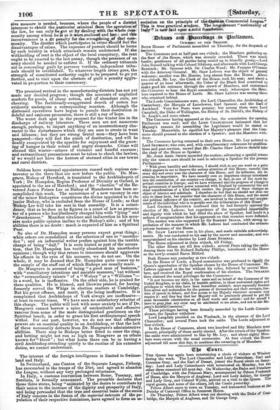tiBebatts anti Vrocetbings in iparliament.
OPENING OF THE SESSION.
BOTH Houses of Parliament assembled on Thursday, for the despatch of lousiness.
The Commons met at half-past one o'clock; the Members gathering on the floor of the House, which was densely crowded. There was much bustle; gentlemen of all parties being mixed up in friendly gossip,—Lord John Russell talking with Colonel Sibthorp, and afterwards with Lord George Bentinck; Mr. Spooner with Sir Charles Wood; Mr. Feargns O'Connor with the Attorney-General. Mr. Shaw Lefevre was the object of general welcome; another was Mr- Berries, long absent from the House. About two o'clock, Mr. Ley, the Clerk of the House, took his seat; and about a quarter of an hour afterwards, the Usher of the Black Rod contrived to make good his entrance through the crowd of Members' and summoned the Ccmmons to hear the Royal commission read; whereupon the Mem- bers repaired to the House of Lords. Mr. Shaw Lefevre was among those who remained behind.
The Lords Commissioners were, the Lord Chancellor, the Archbishop of Canterbury, the Marquis of Lansdowne, Earl Spencer, and the Earl of Auckland. Very few Peers were present, but among them were Lord Campbell, the Duke of Wellington, the Bishop of St. David's, the Bishop of St. Asaph's, and some others. The Commons having appeared at the bar, the commission for opening Parliament was read; and the LORD Castronton intimated that her Majesty's reasons for assembling the Legislature would be stated on Tuesday. Meanwhile, he signified her Majesty's pleasure that the Com- mons should proceed to the election of a Speaker; and the Members with- drew.
The Commons having returned to their own House, Mr. Ley pointed to Lord SE vuoca; who rose, and, with complimentary references to qualifica- tions and past services, moved that Mr. Charles Shaw Lefevre should take the chair of the House as Speaker.
Mr. JOHN ABEL &urn seconded the motion; advancing a special reason why the utmost care should be used in selecting a Speaker for the present Parliament- " With great humility and deference, I should wish to say one word on a point which appears to me to deserve the serious attention of this House; namely, that every. day and every year the character of this House, and its influence, are in- creasing in importance. We have recently seen an important change introduced into the constitution of one country—a change, in fact, in one of the most im- portant countries in Europe; and we have witnessed also the progress of change in the government of another power connected with England by commercial ties and other considerations of a kind which renders the progress of these changes an object of interest and solicitude. I therefore do feel that we should not shut our eyes to these facts, but consider that the character of this House, and the moral and political influence of the country, are involved in the character and acquire- ments of the individual wh'o is to preside over the deliberations of this House."
Lord GEORGE BENTINCK confessed that he had formerly opposed the election of Mr. Lefevre: but experience of the unequalled impartiality and dignity with which he had filled the place of Speaker, had made it a subject of congratulation that his opponents on that occasion were defeated. The motion was also supported by Sir ROBERT Notts, with strong ap- probation of the manner in which Mr. Lefevre had conducted the arduous private business of the House. Mr. SHAW LEFEYRE rose in his place, and made suitable acknowledg- ments. He was conducted to his seat by the mover and seconder; and was congratulated on his election by Lord Joust RUSSELL. The House adjourned at three o'clock, till Friday. The other House sat till five o'clock; several Peers taking the oaths. Among them was Sir Richard Bulkeley Phillips, introduced to the House as the newly-created Baron Milford.
Both Houses met yesterday at two o'clock.
In the House of Lords, a Royal commission was produced to signify the Queen's approbation of the Speaker chosen by the House of Commons. Mr. Lefevre appeared at the bar without his robes, followed by several Mem hers, and received the Royal confirmation of his election. The SPEAKER then claimed the usual privileges for the Commons— "It now becomes my duty, in the name and on behalf of the Commons of the United Kingdom, to lay claim, by humble petition, to those undoubted rights and privileges to which they have been heretofore entitled; more especially freedom from arrest and molestation for the persons of themselves and their servants, free- dom of speech in debate, and free access to her Majesty. whenever occasion may require it : and they beg that her Majesty will be graciously pleased to put the most favourable construction on all their words and actions: and for myself I have to pray.,that any error may be attributed to me alone, and not to her Ma- jesty's faithful Commons."
These privileges having been formally conceded by the Lords Commis- sioners, the Speaker withdrew. Lord Langdale presided on the Woolsack, in the absence of the Lord Chancellor; • and several Peers took the oaths. The Lords adjourned at four o'clock.
In the House of Commons, about two hundred and fifty Members were present, principally of those newly elected. After the return of the Speaker, the oaths were administered to him by Mr. Ley; and about eighty Mem- bers were sworn with the usual ceremonies. At four o'clock the House adjourned till noon this day, to continue the swearing-in of Members.


























 Previous page
Previous page